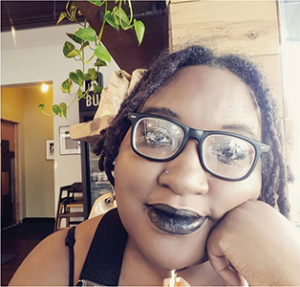Niki Massey, and Why Some Humanist Voices Don’t Get Heard

NIKI MASSEY DIED on October 1, 2016, at the age of thirty-five.
Chances are good you don’t know who Niki Massey was, that you never heard her name until just now. I want to talk about why that is. I want to talk about why some humanist and atheist voices get widely heard, and others don’t.
Some of it, of course, is luck. When “New Atheism” exploded and our movement changed forever, some people already had a significant audience, and had good relationships with publishers and publicity machines. Some people happened to hit a nerve, at a time when those nerves were raw and ready to be hit for thousands or millions of people. And some of it, of course, is talent. If you think well, write well, speak or sing well, of course that increases the chances that your voice will be heard.
But there are other, less benign reasons that some of us don’t get heard. So I want to take a moment to talk about Niki Massey, and about why her voice was so deeply loved by the people who knew it—and yet so unknown in the larger humanist world.
 Niki was an exceptional writer. She was relentless, razor-sharp, laser-bright, hilarious. She gave rant like nobody I know: her rants were loaded with beautifully creative invective blended with perceptive, concise analysis that cut straight to the heart of what the hell was wrong with people. And her writing always showed kindness and compassion. It wasn’t the quiet, soft-spoken compassion that holds your hand and brings you tea and reassures you that everything’s going to be okay. It was the compassion that sees people in pain and flies into a rage at the people causing it; the kind of compassion that reassures you that no, you’re not imagining it, things are bloody well not okay.
Niki was an exceptional writer. She was relentless, razor-sharp, laser-bright, hilarious. She gave rant like nobody I know: her rants were loaded with beautifully creative invective blended with perceptive, concise analysis that cut straight to the heart of what the hell was wrong with people. And her writing always showed kindness and compassion. It wasn’t the quiet, soft-spoken compassion that holds your hand and brings you tea and reassures you that everything’s going to be okay. It was the compassion that sees people in pain and flies into a rage at the people causing it; the kind of compassion that reassures you that no, you’re not imagining it, things are bloody well not okay.
Niki was also black, female, disabled, and poor. Let’s talk about that.
There are thousands of ways that being black, female, disabled, and poor makes it harder for your voice to be heard. A huge part of it is simply time—and money, which is also time. Marginalized people tend to earn less money, which means working longer hours just to get by, which means less time to write, speak, record. The disability system in the United States forces sick people, disabled people, and people in pain, to spend their already limited energy struggling and clawing their way through a Kafkaesque bureaucracy to get the benefits they’re entitled to. (And far too often the system forces people to do all this and still ends up shooting them down.) Poor people can’t afford to speak at conferences where they’re asked to do it for free, where in some cases they’re asked to cover their own costs. It can, of course, be hard for secular conferences to cover speaker costs, but when they don’t it silences marginalized voices.
And part of this silencing comes from the fact that bigger, more visible mainstream media platforms are largely run by white, able-bodied men—who tend to give work to other white, able-bodied men, the people they’re more comfortable with, in a system that can perpetuate itself indefinitely. Even smaller media platforms do this. Pretty much any media platform that isn’t specifically dedicated to marginalized voices or inclusivity does this. Privilege is an affirmative action program for mediocre white men. Sorry, did that come out a little harsh? I’m thinking of Niki as I write this, and Niki didn’t care who she pissed off.
That brings me to another reason, the even more insidious reason, that marginalized voices don’t get heard. They don’t get heard because people don’t want to hear what they have to say. They don’t get heard because marginalized voices demand that people change.
Niki Massey made no secret of her anger. And that included her anger at atheists, humanists, skeptics, and the communities and organizations that serve them. She wasn’t content to sit around in a cozy circle talking about ten more reasons why God doesn’t exist and patting each other on the back for how smart we are to have figured that out. When something was wrong in the secular movement, when it was shutting out people like her, she wasn’t shy about saying so.
This can make a voice not so popular. Even humanists, committed to a better world, can be very resistant to being told, “The way you can make a better world is to do better and quit screwing up.” It’s an understandable resistance, it’s human—but it’s frustrating as hell. If we’re genuinely committed to humanist values, including the values of equality and diversity, we need to be willing to listen when people tell us we’re falling short. When the call is coming from inside the house, we need to pay attention. And we need to build structures that boost the signals of marginalized people speaking important truths that are uncomfortable or hard to hear.
I’ve encountered this myself. When I write and speak about how angry I am at religion, atheists cheer me on, applauding my blunt, unapologetic, take-no-prisoners attitude. When I write and speak about how angry I am at sexism and misogyny—including the sexism and misogyny that’s all too common among atheists and in organized atheism and humanism—I’m told to be nicer, more understanding, more patient, more willing to draw flies with honey instead of vinegar. And that’s at best. At worst, I’m harassed, targeted with grotesque slurs, or threatened with assault or rape or death.
Niki Massey died on October 1, 2016, at the age of thirty-five. She was a good friend and a close colleague: she was one of the co-founders of The-Orbit.net, the atheist social justice blogging collective where I contribute. She was also on the advisory council of the American Humanist Association’s Feminist Humanist Alliance. As of this writing, we don’t know how she died. She had serious health problems, which were often untreated or under-treated. She had been, at times, suicidal. She had serious mental health problems, exacerbated both by the Kafkaesque disability and healthcare systems and by the serious, measurable stressors that marginalized people experience every day. One way or another, the systems that screw up the lives of poor, black, disabled women almost certainly contributed to her death.
And the world is sadder without her voice. I’m reminded of a recent episode of the webcomic Oglaf (note: it’s often sexually explicit) where a half-naked military leader is handing out medals made of cardboard and macaroni and encouraging his army to join “Paladins for Group Sex”—because, as he says, “We believe that evil gains a foothold when goodness is really fucking dull.” With Niki in the world, goodness was a whole lot less dull. With Niki, goodness was brighter, funnier, snarkier, and sharper. You can still read her blog Seriously?!? at The-Orbit.net. But I wish more of you could have heard her voice when she was still alive.
